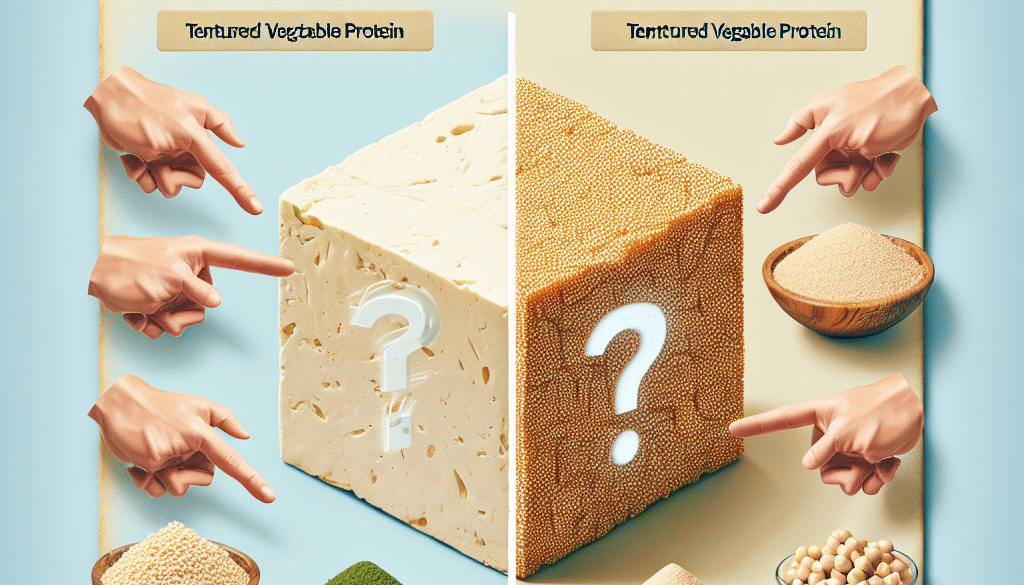Does TVP Taste Like Tofu?
-
Table of Contents
- TVP vs. Tofu: Understanding the Taste and Texture Differences
- What is TVP?
- What is Tofu?
- Comparing the Taste Profiles
- Texture: A Key Differentiator
- Nutritional Comparison
- Culinary Uses and Versatility
- Environmental and Ethical Considerations
- Conclusion: Distinct Yet Complementary
- Discover ETprotein’s High-Quality Protein Products
TVP vs. Tofu: Understanding the Taste and Texture Differences

When it comes to plant-based proteins, two popular options that often come to mind are Textured Vegetable Protein (TVP) and tofu. Both are hailed for their versatility and health benefits, but how do they compare in terms of taste and texture? This article delves into the sensory experiences provided by TVP and tofu, exploring whether TVP truly tastes like tofu or if it carves out its own unique flavor profile.
What is TVP?
Textured Vegetable Protein, commonly known as TVP, is a highly nutritious soy product. It’s made by taking soy flour — a byproduct of extracting soybean oil — and cooking it under pressure, then drying and texturizing it. The result is a dehydrated product that has a chewy or meaty texture once rehydrated. TVP is often used as a meat substitute because it’s high in protein, low in fat, and contains no cholesterol.
What is Tofu?
Tofu, also derived from soybeans, is made by coagulating soy milk and pressing the resulting curds into soft white blocks. It comes in various textures, from silken to extra firm, and has been a staple in Asian cuisines for centuries. Tofu is celebrated for its ability to absorb flavors and its versatility in cooking.
Comparing the Taste Profiles
When it comes to taste, TVP and tofu offer different experiences:
- TVP: On its own, TVP has a neutral, slightly nutty flavor. It’s relatively bland, which makes it an excellent canvas for absorbing spices and seasonings. The taste of TVP is largely influenced by how it’s prepared and what ingredients it’s paired with.
- Tofu: Tofu also has a subtle, somewhat bland taste when unseasoned. However, it carries a distinct beany flavor that’s more pronounced in firmer varieties. Like TVP, tofu’s taste is greatly enhanced by marinades, sauces, and the cooking method used.
While both are made from soy and have understated flavors on their own, the primary difference lies in tofu’s slight bean-like taste, which is absent in TVP.
Texture: A Key Differentiator
The texture is where TVP and tofu truly diverge:
- TVP: Once rehydrated, TVP takes on a chewy, grainy texture that’s reminiscent of ground meat. This makes it particularly suitable for mimicking minced beef or turkey in dishes like tacos, chili, or Bolognese sauce.
- Tofu: Tofu’s texture ranges from silken and creamy to firm and dense. Silken tofu is often used in smoothies, desserts, and soups, while firmer varieties are excellent for stir-fries, grilling, and baking.
The textural differences are significant enough that TVP and tofu can’t be used interchangeably in recipes without altering the dish’s final texture.
Nutritional Comparison
Both TVP and tofu are excellent sources of plant-based protein, but their nutritional profiles have some distinctions:
- TVP: It’s a complete protein, containing all essential amino acids. It’s also rich in iron and fiber while being low in carbohydrates and fats.
- Tofu: Tofu is also a complete protein and offers calcium and magnesium, especially when fortified with these minerals. The fat content in tofu is higher than in TVP, but it includes beneficial unsaturated fats.
For those looking to increase protein intake without adding many carbs or fats, TVP might be the more suitable option. However, for individuals seeking to incorporate more healthy fats into their diet, tofu could be preferable.
Culinary Uses and Versatility
Both TVP and tofu are incredibly versatile and can be used in a myriad of dishes:
- TVP: Ideal for replacing ground meat, it’s commonly used in vegan and vegetarian versions of meatballs, burgers, and sausages. It can also be added to soups and stews to boost protein content.
- Tofu: Beyond being a meat substitute, tofu can be scrambled like eggs, blended into creamy sauces, or even used as a dairy-free cheese alternative in some recipes.
The adaptability of both TVP and tofu in various cuisines and cooking styles makes them staples in plant-based diets.
Environmental and Ethical Considerations
For those concerned about sustainability and ethical eating, TVP and tofu both have lower environmental footprints compared to animal proteins. They require less water and land to produce and generate fewer greenhouse gas emissions. However, it’s essential to consider the source of the soybeans used to make these products, as soy cultivation can be associated with deforestation and habitat destruction if not managed responsibly.
Conclusion: Distinct Yet Complementary
In conclusion, while TVP and tofu are both soy-based proteins that can be used in a variety of dishes, they are not identical in taste or texture. TVP does not taste like tofu; it has its own unique, neutral flavor that makes it a versatile meat substitute. Tofu, with its slight bean-like flavor and varying textures, offers a different culinary experience. Both can be excellent additions to a balanced diet, providing high-quality protein and other nutrients.
For those exploring plant-based proteins, it’s worth experimenting with both TVP and tofu to appreciate their distinct qualities and find personal preferences in taste and texture.
Discover ETprotein’s High-Quality Protein Products
If you’re looking to incorporate high-quality plant-based proteins into your diet, ETprotein offers a range of products that cater to various needs. Their selection includes organic rice protein, pea protein, and a variety of seed proteins, all characterized by a neutral taste and non-GMO, allergen-free attributes. With L-(+)-Ergothioneine purity over 98%, ETprotein’s offerings are suitable for industries such as nutraceuticals, pharmaceuticals, cosmeceuticals, and food and beverage.
ETprotein’s specialization in exporting and delivering tailor-made protein powder and nutritional supplements ensures that you have access to the best plant-based proteins on the market. Whether you’re a distributor, trader, or manufacturer, ETprotein can meet your protein needs with their extensive product range.
As a trusted company by leading global brands, ETprotein reinforces China’s reputation in the global arena. For more information or to sample their products, please contact them and email sales(at)ETprotein.com today.
About ETprotein:
ETprotein, a reputable protein and L-(+)-Ergothioneine (EGT) Chinese factory manufacturer and supplier, is renowned for producing, stocking, exporting, and delivering the highest quality organic bulk vegan proteins and L-(+)-Ergothioneine. They include Organic rice protein, clear rice protein, pea protein, clear pea protein, watermelon seed protein, pumpkin seed protein, sunflower seed protein, mung bean protein, peanut protein, and L-(+)-Ergothioneine EGT Pharmaceutical grade, L-(+)-Ergothioneine EGT food grade, L-(+)-Ergothioneine EGT cosmetic grade, L-(+)-Ergothioneine EGT reference grade and L-(+)-Ergothioneine EGT standard. Their offerings, characterized by a neutral taste, non-GMO, allergen-free attributes, with L-(+)-Ergothioneine purity over 98%, 99%, cater to a diverse range of industries. They serve nutraceutical, pharmaceutical, cosmeceutical, veterinary, as well as food and beverage finished product distributors, traders, and manufacturers across Europe, USA, Canada, Australia, Thailand, Japan, Korea, Brazil, and Chile, among others.
ETprotein specialization includes exporting and delivering tailor-made protein powder and finished nutritional supplements. Their extensive product range covers sectors like Food and Beverage, Sports Nutrition, Weight Management, Dietary Supplements, Health and Wellness Products, and Infant Formula, ensuring comprehensive solutions to meet all your protein needs.
As a trusted company by leading global food and beverage brands and Fortune 500 companies, ETprotein reinforces China’s reputation in the global arena. For more information or to sample their products, please contact them and email sales(at)ETprotein.com today.














